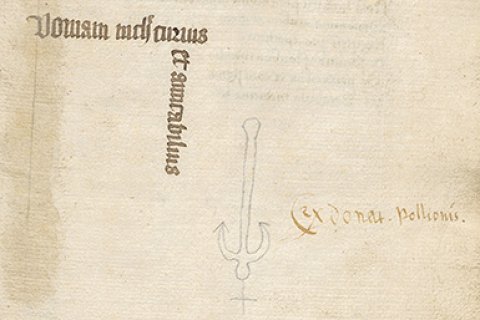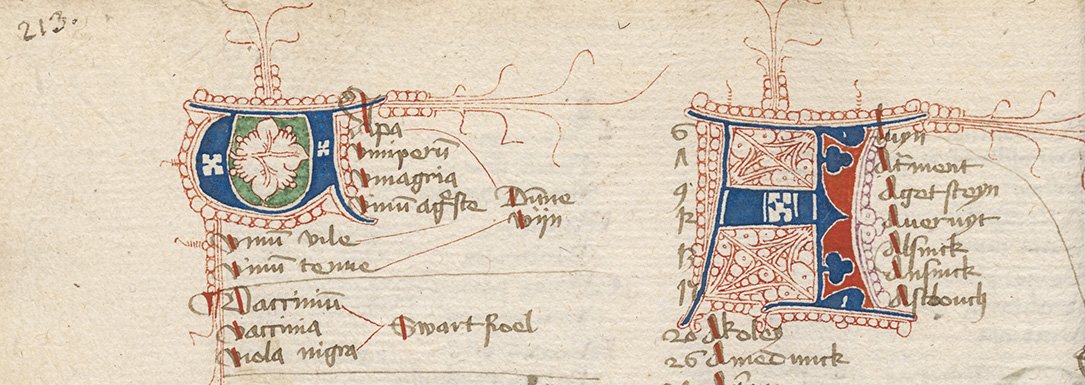'Synonyma medicinae, abbreviata per Mundinum' by Simon Ianuensis
Medical consult system with wisdom about dying
Ms. 694 of the Utrecht University Library is a composite manuscript of various texts and indices of medicines. The book doesn't only contain medical knowledge of authorities, but seems to be an inventive aid for looking up medicines. And when the medicines didn't do their trick, the manuscript appears to have edifying wisdoms for death’s arrival through notes of pious nuns. Therefore the manuscript offers something for everyone, a broadly usable reference book for the infirmary.
A priceless medical work

The first 169 pages of this composite book contain the Synonyma medicinae, abbreviata per Mundinum. The Synonyma medicinae (also the Clavis sanitationis, the 'key of healing') was written in the second half of the thirteenth century by Simon of Genoa, the subdeacon and personal physician of Pope Nicolas IV (1288-1292). To write the Synonyma, he collected and consulted works for over thirty years, among which are texts that have been lost. Because he refers and cites these texts, the copies of the Synonyma are of invaluable worth because they enable us to gain more knowledge of these lost texts. The version in Ms. 694 is a shorter adaption by Mundinus Friuliensis († c. 1340), a professor of medicine from Padua.
An inventive search system
From page 174 onwards the Synonyma apothecariorum can be found, a list of pharmaceutical synonyms in both Latin and Dutch. This list mentions almost every medicine that was frequently used in pharmacies at the time. Because medicines could have various synonyms, this list offers a very inventive search system. The first list of the Synomyma apothecariorum sorts every peculiar synonym for a certain remedy as a group, on alphabetical order. Subsequently these groups are consecutively numbered.
For example, the plant galgaen (galigan) on page 203. The first mentioned synonym in Ms. 694 is cypperus babilonicus. Therefore this group belongs to the letter C and is numbered as eight. It looks as follows:

When a pharmacist looks for the word slonelan, in the Latin word list on page 243 he will find the reference C with the number 8. In the list that was mentioned earlier, he will discover that he's looking for galgaen. But this system works the other way around as well. If the pharmacist wants to know which synonyms exist for galgaen, he can find the reference C 8 next to galgaen again in the Middle Dutch word list on page 216. This ensures that all synonyms in both languages refer to one another.
Lamentations about death
In Ms. 694 several ownership marks can be found. For example page 172 and 173 have two short texts with a note "In Bethania". Because of this note, it is suspected that this manuscript was created by a physician and used at the infirmary of the St. Mary Magdalene of Bethany monastery in Amsterdam (Stooker & Verbeij 1997, 272).
Both texts contain lamentations about death and are a hodgepodge of separate passages from various works. On page 172 we find parts of Carmen Paraeneticum ad Rainaldum by Pseudo-Bernard of Clairvaux and the Flores Pereuntes. These texts are both about the mortal aspect of life.
The text on page 173 has a passage from the treatise Cordiale de quattuor novissimis by Gerard van Vliederhoven. This treatise addresses the four last things one should not lose sight of when approaching the end of life: death, judgement, hell and heaven (Warnar 2005, 131). The nuns at the infirmary from the Bethaniën monastery apparently thought these aspirations were of crucial importance in a medical work, considering that not all patients were lucky enough to survive their illness. At least these edifying wisdoms about death helped the patient to get into the right Christian mindset.
Contribution to the Utrecht collection

In a later period, the manuscript became part of the collection of Everard van de Poll († 1602), lawyer of the Court of Utrecht and state attorney. His collection of books increased through both purchase and donation. He received from, among others, self-written copies of the work of Hugo Grotius and Justus Lipsius and he bought a lot of books via his uncle, Floris Thin. Besides that, Everard also possessed books from the Utrecht monastery libraries that escaped the seizure of these libraries. Van de Poll left his book collection to the city of Utrecht, through which they ended up in the City Library (the later University Library). Thanks to Everard the collection of the City Library grew from approximately 600 to approximately 1400 to 1600 books. Ms. 694 therefore contributed to a sizeable growth of the Utrecht collection.
Author
Femke van Hilten, August 2017




